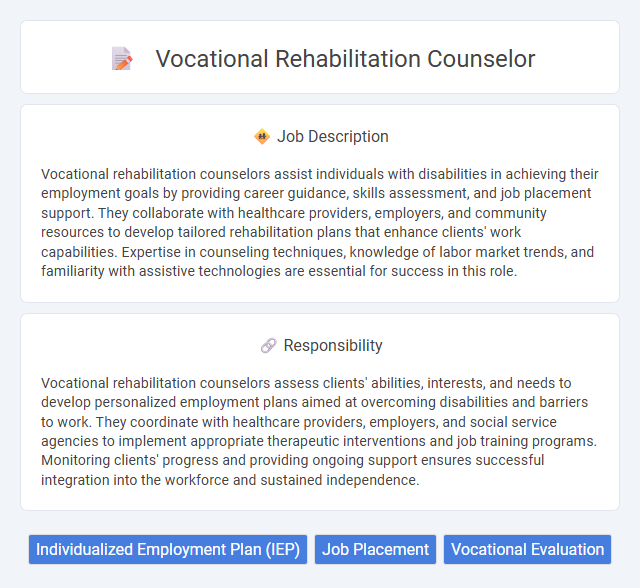
Vocational rehabilitation counselors assist individuals with disabilities in achieving their employment goals by providing career guidance, skills assessment, and job placement support. They collaborate with healthcare providers, employers, and community resources to develop tailored rehabilitation plans that enhance clients' work capabilities. Expertise in counseling techniques, knowledge of labor market trends, and familiarity with assistive technologies are essential for success in this role.
Individuals with strong empathy and excellent communication skills are likely to be well-suited for a vocational rehabilitation counselor role, as this job involves assisting people with disabilities or those recovering from injuries to re-enter the workforce. Those who are patient, adaptable, and have a genuine interest in helping others overcome physical, emotional, or psychological barriers may thrive in this career. Conversely, candidates who struggle with interpersonal interactions or lack emotional resilience might find this profession challenging.
Qualification
Vocational rehabilitation counselors typically require a master's degree in counseling, psychology, or a related field, with specialized training in vocational assessment and rehabilitation techniques. Certification such as the Certified Rehabilitation Counselor (CRC) credential enhances job prospects by demonstrating expertise in client evaluation, career counseling, and job placement strategies. Strong interpersonal skills and knowledge of disability laws and workplace accommodations are essential for effectively assisting individuals with disabilities in achieving employment goals.
Responsibility
Vocational rehabilitation counselors assess clients' abilities, interests, and needs to develop personalized employment plans aimed at overcoming disabilities and barriers to work. They coordinate with healthcare providers, employers, and social service agencies to implement appropriate therapeutic interventions and job training programs. Monitoring clients' progress and providing ongoing support ensures successful integration into the workforce and sustained independence.
Benefit
Vocational rehabilitation counselors are likely to experience substantial benefits including personal fulfillment from helping clients regain independence and secure employment. They probably enjoy stable job demand due to ongoing needs for workforce reintegration and disability support services. Enhanced communication and problem-solving skills may also improve as a result of their work in diverse and challenging environments.
Challenge
The role of a vocational rehabilitation counselor likely presents challenges related to assessing diverse client needs and developing personalized employment plans. Managing complex cases involving physical, mental, or emotional disabilities may require significant problem-solving skills and adaptability. There is a probable necessity to navigate various social services and employment barriers to effectively support client reintegration into the workforce.
Career Advancement
Vocational rehabilitation counselors can advance their careers by obtaining advanced certifications such as CRC (Certified Rehabilitation Counselor) or pursuing a master's degree in counseling or social work, which enhances their expertise and job prospects. Gaining experience in specialized areas like mental health, substance abuse, or disability management increases opportunities for leadership roles and higher salaries. Networking within professional associations like the Commission on Rehabilitation Counselor Certification (CRCC) also provides access to seminars and training critical for career growth.
Key Terms
Individualized Employment Plan (IEP)
Vocational rehabilitation counselors develop and implement Individualized Employment Plans (IEPs) tailored to clients' unique skills, interests, and barriers to employment. The IEP outlines specific goals, job training, and support services designed to enhance job readiness and secure sustainable employment. Monitoring progress and adjusting the plan ensures clients achieve optimal vocational outcomes aligned with labor market demands.
Job Placement
Vocational rehabilitation counselors specialize in helping individuals with disabilities secure suitable employment by assessing skills, coordinating training programs, and collaborating with employers to identify job opportunities. They develop personalized job placement plans that align with clients' abilities and labor market demands, enhancing the likelihood of successful employment integration. Expertise in career counseling, labor market trends, and disability accommodations is essential for optimizing job placement outcomes in this role.
Vocational Evaluation
Vocational rehabilitation counselors specialize in conducting comprehensive vocational evaluations to assess individuals' skills, interests, and work-related abilities for effective job placement. These evaluations integrate psychometric testing, interviews, and functional capacity assessments to create tailored employment plans. Their expertise ensures alignment between clients' capabilities and labor market demands, facilitating successful workforce reintegration.
 kuljobs.com
kuljobs.com